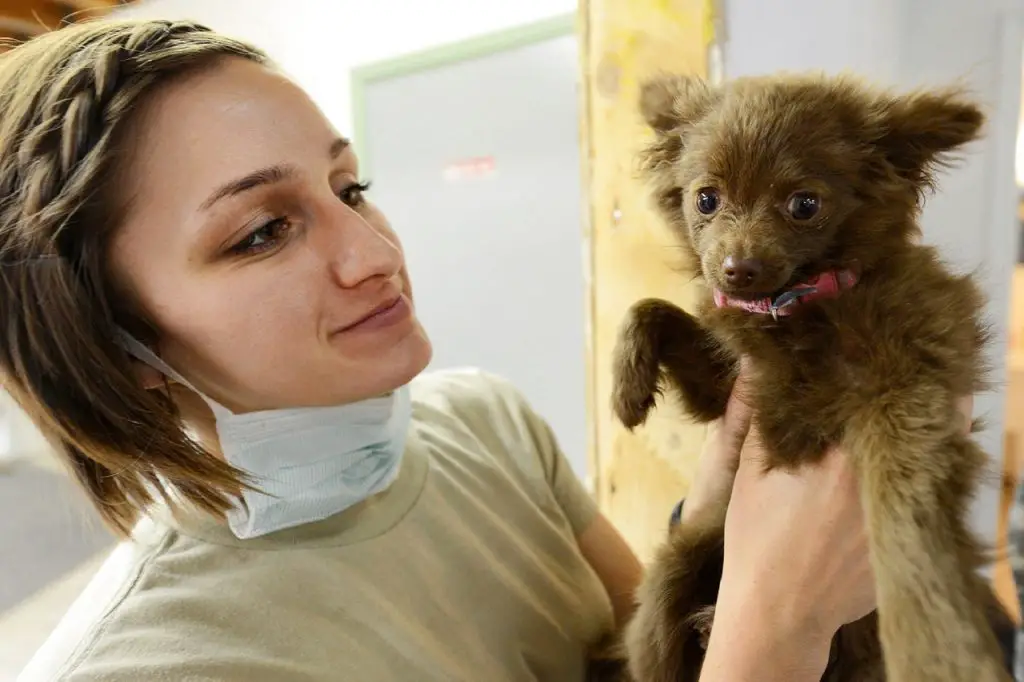Dogs are susceptible to a variety of illnesses that can affect their health, just like humans. But, can dogs get croup?
In this blog post, we will discuss what croup is, the symptoms to look for, and how to treat it if your dog does develop this respiratory infection.
Key Takeaway
- A croup on a dog refers to the area of its back that starts from the lumbar vertebrae and ends at the base of the tail, often being evaluated in terms of length, placement, and angulation for breed standards.
- While dogs cannot get croup as it is a condition specific to humans, they can develop a croup-like cough when they have viral respiratory infections such as kennel cough.
- While dogs can develop a croup-like cough from viral respiratory infections such as kennel cough, it’s highly unlikely for them to contract this condition directly from humans.
What Is a Croup On a Dog?
Croup is a viral infection of the upper respiratory tract in dogs. It is characterized by a hacking cough and can be accompanied by a fever, runny nose, and watery eyes.
Croup is most common in young puppies but can occur in dogs of any age. Treatment typically involves rest and supportive care, but more severe cases may require hospitalization.
Croup is caused by viruses such as parainfluenza, adenovirus type-two, or reovirus. These viruses are all highly contagious and are spread through close contact with infected dogs or through the air. Puppies are particularly susceptible to croup because their immune systems are not fully developed.
Infected puppies may display symptoms such as a sudden onset of a harsh, dry cough, difficulty breathing, and a fever. Older dogs may only have a mild cough or no symptoms at all.
Croup is typically diagnosed based on clinical signs and a physical examination. Your veterinarian may also recommend chest x-rays or other tests to rule out other possible causes of your dog’s cough such as kennel cough or heart disease.
Treatment for croup generally involves supportive care such as rest, fluids, and humidifiers. More severe cases may require hospitalization and treatment with antibiotics or antiviral medications.
Croup is a serious condition but can be effectively treated with prompt veterinary care. If your dog is displaying any signs of croup, contact your veterinarian immediately.
Can Dogs Get Croup?

Yes, dogs can get croup though it’s much less common in dogs than in humans. Croup in dogs is usually caused by an infection of the larynx (voice box) or trachea (windpipe). This can be caused by bacteria, viruses, or even allergies.
Infectious croup is more likely to occur in young dogs, while allergic croup is more common in older dogs. Symptoms of croup in dogs include harsh coughing, difficulty breathing, and wheezing.
The most common virus that leads to croup in dogs is the parainfluenza virus. This virus is also one of the most common causes of kennel cough, which is a highly contagious respiratory illness that affects dogs who are housed in close quarters, such as at a kennel or shelter.
While kennel cough is rarely serious, it can be more severe in puppies or older dogs, and can even lead to pneumonia. Treatment for kennel cough usually involves antibiotics and rest. In severe cases, your dog may need to be hospitalized and treated with intravenous fluids and oxygen therapy.
The most common symptom of croup is a barking cough, which can be frightening for both you and your dog. Croup is most commonly seen in young dogs, especially those under one year of age. It can also occur in older dogs, but this is much less common.
Breeds that are most vulnerable to developing croup include:
- Poodles
- Doberman Pinschers
- Labrador Retrievers
- Golden Retrievers
- German Shepherds
If your dog starts showing signs of croup, it’s important to take them to the vet right away. Croup can be a very serious condition, and early diagnosis and treatment are essential.
Symptoms of Croup In Dogs
While dogs cannot technically get croup, a condition specific to humans, they can exhibit similar symptoms when they have conditions like kennel cough or tracheobronchitis.
Strong, Honking Cough
One of the most notable symptoms of a croup-like condition in dogs is a strong, honking cough. This forceful, hacking cough may sound as if the dog has something caught in its throat.
Runny Nose and Sneezing
Dogs with a croup-like condition may also exhibit symptoms such as a runny nose and sneezing. These are signs of respiratory distress and are common in many upper respiratory infections.
Lethargy and Loss of Appetite
Lethargy and loss of appetite are severe symptoms that can accompany this condition. Dogs may seem unusually tired, uninterested in activities they usually enjoy, and may eat less than usual.
Fever
Fever can be another symptom of a croup-like condition in dogs. If your dog is warmer than usual, it could be a sign of illness.
Eye Discharge
Some dogs with a croup-like condition might also have eye discharge. This could manifest as watering eyes or a thicker discharge.
Wheezing and Difficulty Breathing
Wheezing and difficulty breathing are serious symptoms that require immediate attention. These could indicate a severe respiratory infection or other serious health issues.
Can Dogs Get Croup From Humans?

Dogs can get croup from humans if they are exposed to the same viruses that cause the illness in people. However, this is rare and most cases of croup in dogs are caused by other factors, such as allergies or environmental irritants.
Croup is a respiratory illness that is most common in young children, but it can also affect adults and animals. The main symptom of croup is a harsh, barking cough. It can also cause difficulty breathing, a hoarse voice, and a fever.
Croup is usually caused by a virus, such as the flu or the common cold. However, it can also be caused by bacteria or allergies.
Canine croup is most often caused by the parainfluenza virus, which is the same virus that causes kennel cough. However, any virus that causes croup in humans can also cause croup in dogs.
Dogs can catch croup from humans if they are exposed to the virus. The most common way for this to happen is if a human with croup coughs or sneezes near a dog. The virus can also be spread if a human touches a dog and then touches their own face before washing their hands.
Croup is most commonly seen in puppies, but it can occur in dogs of any age. With prompt treatment, most dogs recover from croup without any complications.
While humans usually only catch croup once or twice in their lifetime, dogs can catch it multiple times because they do not develop immunity to the viruses that cause it. This means that even if your dog has had croup before and recovered from it, it can still catch it says PetCoach.
How Do You Treat a Dog With Croup?
Treating a dog with a croup-like cough, often caused by kennel cough, generally involves rest, medication for recovery, and potentially the use of home remedies like honey, humidifiers, and steam therapy.
Rest
A key part of the treatment for dogs showing symptoms of kennel cough, which can resemble croup, is ensuring they get plenty of rest. This allows their immune system to fight off the condition effectively.
Medication
While there is no specific treatment for the viral infection that often causes kennel cough, medications may be prescribed in some cases to speed up recovery. These could include antibiotics to prevent secondary infections or cough suppressants.
Home Remedies
Home remedies can also be helpful in treating a dog with these symptoms. Adding honey to warm water can soothe the throat and reduce coughing. Using a humidifier can help keep the air moist and reduce irritation in the dog’s throat and lungs.
Steam therapy, such as allowing the dog to sit in a bathroom filled with steam from a hot shower, can also be beneficial.
Natural Remedies
Some natural remedies have also been suggested for treating coughing in dogs. For example, continuing the use of honey and coconut oil for at least ten days can be one of the ways to alleviate the symptoms.
FAQs
Q: What is croup?
A: Croup is a viral infection that causes inflammation in the upper airway and results in symptoms such as a barking cough and difficulty breathing.
Q: How do dogs get croup?
A: Dogs can get croup by coming into contact with the virus or through close contact with an infected dog or human. The virus is usually spread through respiratory droplets.
Q: Is croup contagious for other dogs?
A: Yes, croup can be contagious for other dogs. It is important to isolate infected dogs to prevent the spread of the virus to other animals.
Q: Can croup be prevented in dogs?
A: While it may not be possible to completely prevent croup in dogs, maintaining good hygiene practices, such as regular handwashing and keeping dogs away from infected individuals, can help reduce the risk of transmission.
Q: Can croup be dangerous for dogs?
A: Croup can be dangerous for dogs, especially if left untreated. In severe cases, it can lead to difficulty breathing and potentially life-threatening complications.
Q: When should I take my dog to the vet if I suspect croup?
A: If you suspect that your dog has croup, it is recommended to take them to the vet as soon as possible for a proper diagnosis and appropriate treatment.
Q: Can humans get croup from dogs?
A: While croup is primarily a human illness, in rare cases, humans may be able to contract the virus from infected dogs. It is important to practice good hygiene when dealing with a sick dog to minimize the risk of transmission.
Conclusion and final thoughts
In conclusion, while croup is not a common condition in dogs, it is possible for them to contract it.
As with any illness or medical concern, it’s important to be aware of the symptoms and seek veterinary care if necessary.
Keeping your dog up-to-date on vaccinations and practicing good hygiene can also help prevent the spread of viruses that may lead to croup.




